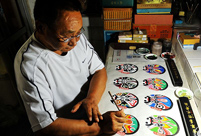The Chinese people should remember the July 7 as the day that the Japanese army attacked Chinese defenders at Lugou Bridge (known as Marco Polo Bridge in the West), and the nearby fortress town of Wanping, marking the beginning of Japan's war of aggression against China seventy-seven years ago. The invasion of Japanese militarists caused a national disaster in China. A huge volume of evidence reveals the crimes the Japanese army committed during this war.
Prime Minister Shinzo Abe and the right-wing forces in Japan Japan have denied Japan's historical aggression against China, visited the Yasukuni Shrine, gone on to question the Kono Statement, and denied that the Nanjing Massacre ever occurred.
The Central Archives of China have been releasing files on the confessions written by war criminals including Suzuki Keiku since July 3, 2014. The archive plans to publish one confession each day over 45 days. The confessions reveal the atrocities of the Japanese army, and awaken painful memories among the victims' painful recollections.
Xia Shuqin, 86, a Nanjing Massacre survivor, told People's Daily that she could not help crying when the sight of the handwritten confession recalled her tragic childhood. During the Nanjing Massacre all seven of Xia's other family members were killed - Xia hereslf only survived because she fainted after being stabbed three times.
Jay Vinyard, one of the American Flying Tigers pilots, learned that Suzuki Keiku had given the order to kill 1,280 innocent people in Luan County, north China's Hebei province. "This tragedy reveals the atrocities of the Japanese invaders," he said.
Li Minghua, deputy director of the Central Archives of China, told the press that the central archives would release the handwritten confessions from July 3, 2014. In addition, he told People's Daily that the Japanese army had conscripted "comfort women", plundered and demolished China's public property, conducted gas attacks, made bacteriological weapons, and established no-human zones during the war of aggression.
Karl Pilny, a German expert on East Asia, has conducted thorough research on the history of Japanese aggression, the Nanjing Massacre, and the human experiments on Chinese citizens conducted by Unit 731. He has read the confessions and said that there are so many files on the crimes of Japanese army that it is impossible to release them all.
Valery Kistanov, head of the Center for Japanese Studies Institute of the Far East of the Russian Academy of Sciences has read the confessions. He takes the view that it is necessary to make the world aware of the full extent of the crimes Japan committed during WWII.
Shigenori Nishikawa, 86, a representative of the liaison board of the National Association of War Bereaved Families for Peace said that many Japanese people know little about the terrible crimes committed by the Japanese army during the Japanese War of Aggression against China.
The German army and Japanese army both invaded other countries during WWII, but they have different attitudes towards their own historical issues. Germany has passed laws to ban the promotion of Nazism in any form, to ban the use of swastikas, and to punish people who deny the Nazi Holocaust in public.
Karl Pilny points out that in trying to deny the Nanjing Massacre, right-wing Japanese leaders are as shameless as Germans who wish to deny the Nazi Holocaust and the Nazi concentration camps.
Zhu Chengshan, the curator of the Memorial Hall for Compatriots killed in the Nanjing Massacre by Japanese Forces of Aggression, said that some forces in Japan encourage the denial of historical issues, arousing awareness of Japan's pasthistory of trouble making and leading to doubts about which path Japan will take in the future. Zhu's words indicate the level of domestic and international concerns over Japan's attitudes towards its historical issues, which are strongly influenced by right wing politicians.
Shigenori Nishikawa remains alert to Japan's attitude toward its historical issues. Nearly every day since his retirement in 1999 he has taken a 3-hour train journey to sit in on the meetings of the Japanese Congress. He says that the congress never discusses the wartime crimes committed by the Japanese army, or engages in any introspection over the crimes. He believes that the congress should conduct some serious reflection on the crimes committed during WWII, and make a sincere apology to the Chinese people.
Nell Calloway, director of the Chennault Aviation and Military Museum in Los Angeles, agrees. "I do feel that the history needs to be taught so that what was actually happening then will not be repeated in the future. We are working on a new exhibition that will better tell this story. We want people to understand that the Japanese killed between 25 and 50 million Chinese people. We want to teach about the Chinese nature and culture and the resilience of the people to overcome this great adversity. We want people here to appreciate the Chinese heroes who have never had a strong voice in the U.S."
In February 2014, China and Russia declared that in 2015 they will jointly commemorate the 70th anniversary of the victory of the World Anti-Fascist War and the Chinese People's War of Resistance Against Japanese aggression. Valery Kistanov proposed that more records of WWII such as handwritten confessions should be released during the commemoration activities to help people remember that peace was achieved only following a hard struggle.
Peter Nick Cruz, an American university professor of history, says that as long as the current Japanese government attempts to deny and whitewash Japan's history of aggression, China and other victims should continue to reveal the truth.
The Chinese Foreign Ministry recently confirmed that China is applying to UNESCO to list the historical archives related to the 1937 Nanjing Massacre and Japan's enslavement of wartime prostitutes on UNESCO's Memory of the World Register. The Central Archives of China are now sorting out the handwritten confessions of the war criminals, which will first be released and then later published.
This article was edited and translated from 《国际舆论严厉谴责日本发动侵略战争暴行 》,Author :Pei Yongjiang, Song Haoxin, Li Zhiwei, Chen Lidan, Li Boya, Huang Fahong, Lin Xuedan, Liu Junguo, source :People's Daily.
 Moms on their kid’s coming out
Moms on their kid’s coming out Chinese fighters through lens
Chinese fighters through lens
 Children attend gymnastics training in summer
Children attend gymnastics training in summer
 Beautiful sceneries along the special travel route in Xinjiang
Beautiful sceneries along the special travel route in Xinjiang
 Beauty SWAT member in Xinjiang sparks online frenzy
Beauty SWAT member in Xinjiang sparks online frenzy
 Germany beat Argentina 1-0 to win World Cup
Germany beat Argentina 1-0 to win World Cup
 National fitness team members integrate traditional and modern beauty
National fitness team members integrate traditional and modern beauty Collection of 'China Dream' public-spirited ads
Collection of 'China Dream' public-spirited ads  How Chinese men kill the time when their wives practice square dancing?
How Chinese men kill the time when their wives practice square dancing? China's largest 3D printer builds 2-meter-long boat
China's largest 3D printer builds 2-meter-long boat
 One-legged women with high heel goes viral on Internet
One-legged women with high heel goes viral on Internet Photos of the Week
(July 6 - July 12)
Photos of the Week
(July 6 - July 12)
 'Super moon' seen in Beijing
'Super moon' seen in Beijing
 Happy life in Xinjiang
Happy life in Xinjiang
 'Finding Nemo' in Seattle Aquarium
'Finding Nemo' in Seattle AquariumDay|Week|Month